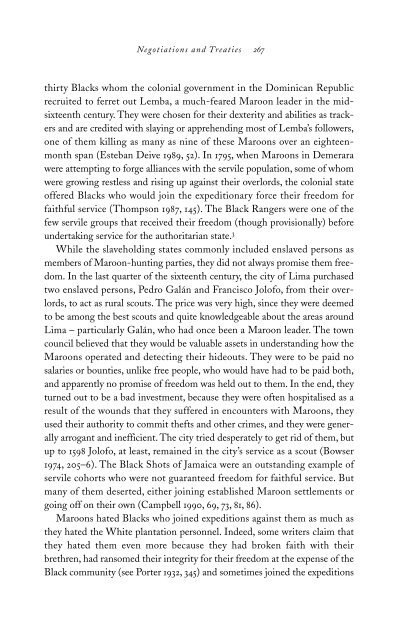60199616-flight-to-freedom-african-runaways-and-maroons-in-the-americas
60199616-flight-to-freedom-african-runaways-and-maroons-in-the-americas
60199616-flight-to-freedom-african-runaways-and-maroons-in-the-americas
Create successful ePaper yourself
Turn your PDF publications into a flip-book with our unique Google optimized e-Paper software.
Negotiations <strong>and</strong> Treaties<br />
267<br />
thirty Blacks whom <strong>the</strong> colonial government <strong>in</strong> <strong>the</strong> Dom<strong>in</strong>ican Republic<br />
recruited <strong>to</strong> ferret out Lemba, a much-feared Maroon leader <strong>in</strong> <strong>the</strong> midsixteenth<br />
century. They were chosen for <strong>the</strong>ir dexterity <strong>and</strong> abilities as trackers<br />
<strong>and</strong> are credited with slay<strong>in</strong>g or apprehend<strong>in</strong>g most of Lemba’s followers,<br />
one of <strong>the</strong>m kill<strong>in</strong>g as many as n<strong>in</strong>e of <strong>the</strong>se Maroons over an eighteenmonth<br />
span (Esteban Deive 1989, 52). In 1795, when Maroons <strong>in</strong> Demerara<br />
were attempt<strong>in</strong>g <strong>to</strong> forge alliances with <strong>the</strong> servile population, some of whom<br />
were grow<strong>in</strong>g restless <strong>and</strong> ris<strong>in</strong>g up aga<strong>in</strong>st <strong>the</strong>ir overlords, <strong>the</strong> colonial state<br />
offered Blacks who would jo<strong>in</strong> <strong>the</strong> expeditionary force <strong>the</strong>ir <strong>freedom</strong> for<br />
faithful service (Thompson 1987, 145). The Black Rangers were one of <strong>the</strong><br />
few servile groups that received <strong>the</strong>ir <strong>freedom</strong> (though provisionally) before<br />
undertak<strong>in</strong>g service for <strong>the</strong> authoritarian state. 3<br />
While <strong>the</strong> slavehold<strong>in</strong>g states commonly <strong>in</strong>cluded enslaved persons as<br />
members of Maroon-hunt<strong>in</strong>g parties, <strong>the</strong>y did not always promise <strong>the</strong>m <strong>freedom</strong>.<br />
In <strong>the</strong> last quarter of <strong>the</strong> sixteenth century, <strong>the</strong> city of Lima purchased<br />
two enslaved persons, Pedro Galán <strong>and</strong> Francisco Jolofo, from <strong>the</strong>ir overlords,<br />
<strong>to</strong> act as rural scouts. The price was very high, s<strong>in</strong>ce <strong>the</strong>y were deemed<br />
<strong>to</strong> be among <strong>the</strong> best scouts <strong>and</strong> quite knowledgeable about <strong>the</strong> areas around<br />
Lima – particularly Galán, who had once been a Maroon leader. The <strong>to</strong>wn<br />
council believed that <strong>the</strong>y would be valuable assets <strong>in</strong> underst<strong>and</strong><strong>in</strong>g how <strong>the</strong><br />
Maroons operated <strong>and</strong> detect<strong>in</strong>g <strong>the</strong>ir hideouts. They were <strong>to</strong> be paid no<br />
salaries or bounties, unlike free people, who would have had <strong>to</strong> be paid both,<br />
<strong>and</strong> apparently no promise of <strong>freedom</strong> was held out <strong>to</strong> <strong>the</strong>m. In <strong>the</strong> end, <strong>the</strong>y<br />
turned out <strong>to</strong> be a bad <strong>in</strong>vestment, because <strong>the</strong>y were often hospitalised as a<br />
result of <strong>the</strong> wounds that <strong>the</strong>y suffered <strong>in</strong> encounters with Maroons, <strong>the</strong>y<br />
used <strong>the</strong>ir authority <strong>to</strong> commit <strong>the</strong>fts <strong>and</strong> o<strong>the</strong>r crimes, <strong>and</strong> <strong>the</strong>y were generally<br />
arrogant <strong>and</strong> <strong>in</strong>efficient. The city tried desperately <strong>to</strong> get rid of <strong>the</strong>m, but<br />
up <strong>to</strong> 1598 Jolofo, at least, rema<strong>in</strong>ed <strong>in</strong> <strong>the</strong> city’s service as a scout (Bowser<br />
1974, 205–6). The Black Shots of Jamaica were an outst<strong>and</strong><strong>in</strong>g example of<br />
servile cohorts who were not guaranteed <strong>freedom</strong> for faithful service. But<br />
many of <strong>the</strong>m deserted, ei<strong>the</strong>r jo<strong>in</strong><strong>in</strong>g established Maroon settlements or<br />
go<strong>in</strong>g off on <strong>the</strong>ir own (Campbell 1990, 69, 73, 81, 86).<br />
Maroons hated Blacks who jo<strong>in</strong>ed expeditions aga<strong>in</strong>st <strong>the</strong>m as much as<br />
<strong>the</strong>y hated <strong>the</strong> White plantation personnel. Indeed, some writers claim that<br />
<strong>the</strong>y hated <strong>the</strong>m even more because <strong>the</strong>y had broken faith with <strong>the</strong>ir<br />
brethren, had ransomed <strong>the</strong>ir <strong>in</strong>tegrity for <strong>the</strong>ir <strong>freedom</strong> at <strong>the</strong> expense of <strong>the</strong><br />
Black community (see Porter 1932, 345) <strong>and</strong> sometimes jo<strong>in</strong>ed <strong>the</strong> expeditions


